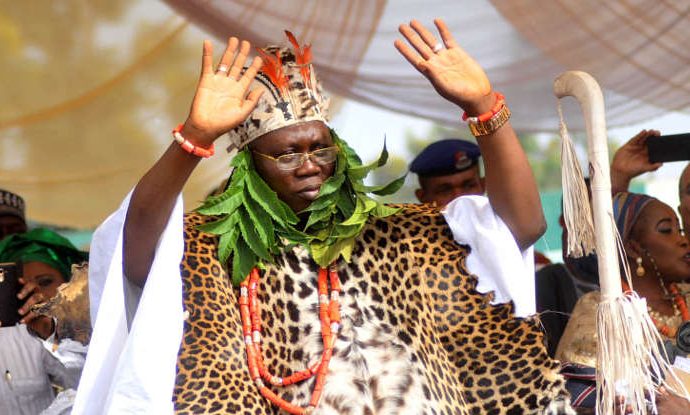Gani Adams Urges Unity Amid Royal Comparisons at Oke Ibadan Festival 2025 At the 2025 edition of the vibrant Oke Ibadan Festival, held at the historic Mapo Hall in Ibadan, the Aare Ona Kakanfo of Yorubaland, Gani Adams, took a firm stand against the ongoing debate over the seniority of Yoruba monarchs—specifically between the Alaafin
Gani Adams Urges Unity Amid Royal Comparisons at Oke Ibadan Festival 2025

At the 2025 edition of the vibrant Oke Ibadan Festival, held at the historic Mapo Hall in Ibadan, the Aare Ona Kakanfo of Yorubaland, Gani Adams, took a firm stand against the ongoing debate over the seniority of Yoruba monarchs—specifically between the Alaafin of Oyo and the Ooni of Ife. The cultural leader and global coordinator of the Oodua Progressive Union issued a heartfelt appeal to the public and content creators, urging them to avoid discussions that may sow discord among the Yoruba traditional institutions.
In his address, Chief Adams described the persistent comparison between the two esteemed royal stools as both “unnecessary” and “capable of heating the polity.” He emphasized the need for mutual respect and unity, reminding all that the Alaafin and the Ooni are globally recognized and highly revered figures within the Yoruba heritage.
Speaker Abbas Declares National Assembly as Nigeria’s Most Underfunded Government Arm
Respecting Tradition: Gani Adams Warns Against Disruptive Comparisons
“I have watched with dismay the recent unnecessary comparison being drawn between the Alaafin of Oyo’s stool and that of the Ooni of Ife,” Adams said. “Let me reiterate that both traditional stools and the revered royal imperial majesties occupying them are two main prominent Obas in Yorubaland and globally.”
The Aare stressed that the Yoruba culture, rich in history and structure, should not be trivialized through sensationalism. He specifically called on bloggers and digital media platforms to act responsibly and desist from publishing content that could undermine the unity of the Yoruba traditional system. Adams warned that such media narratives risk deepening divisions and could damage the longstanding respect accorded to Yoruba royal institutions.
“I especially appeal to bloggers across the region and in the country not to publish content that is capable of creating disunity among our traditional rulers and the respected traditional institutions,” he urged.
Beyond this caution, Adams also used the platform to highlight the cultural and historical relevance of the Oke Ibadan Festival. The annual event, deeply rooted in Yoruba tradition, celebrates the founding of Ibadan—a city rich in war history and cultural heritage. According to Adams, the festival honors not only the people of Ibadan but also their ancestral legacy and core values.
He explained that while different historical accounts exist regarding the origin of Oke Ibadan, there is unanimous agreement that the city was founded by Lagelu, famously known as Oro Apata-Maja. The Oke Ibadan hill, where the city was originally established, plays a significant spiritual and historical role in Ibadan’s formation and resilience.
“The Oke-Ibadan festival is a yearly celebration that honours the founding of Ibadan, the Aboke and the people of Ibadan, Oyo State, Nigeria,” Adams said. “It is a cultural and traditional festival where the Ibadan people pay respect to their ancestors, reiterate their cultural values, and promote unity.”
The Oke Ibadan rock, also known as the Hill of Ibadan, holds deep spiritual significance for the locals. According to Adams, it has historically been considered a source of protection, prosperity, and fertility. In ancient times, the rock provided a strategic vantage point during warfare and was revered for its mystical qualities.
Ibadan people continue to regard the rock as a symbol of strength, often referring to it as a giver of children, wealth, and blessings. This legacy, Adams emphasized, should be preserved and celebrated, especially in the modern age when cultural symbols risk being overshadowed by digital distractions.
In his closing remarks, Gani Adams urged the Oyo State government to prioritize the Oke Ibadan rock as a key heritage site with vast tourism potential. Drawing comparisons to Olumo Rock in Abeokuta and other notable natural landmarks like Oke Idanre in Ondo and Oke Erinmo in Ilesa, he called for investments that will spotlight the rock’s cultural importance and attract global attention.
“It is time we reflect Oke Ibadan as one of the most formidable and historical rocks in Yorubaland. Let us place it where it belongs—among the top tourist and heritage sites in Nigeria,” Adams concluded.
The 2025 Oke Ibadan Festival thus served as more than a cultural event; it became a clarion call for unity, respect for tradition, and cultural preservation in an age of digital storytelling. With leaders like Gani Adams championing the cause, the legacy of Yoruba heritage continues to stand tall—much like the rock that inspired a city.

















Leave a Comment
Your email address will not be published. Required fields are marked with *